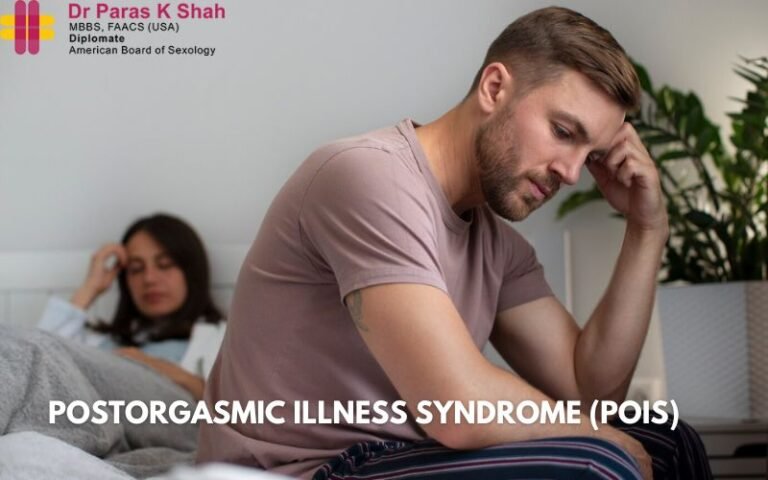
Introduction
Postorgasmic Illness Syndrome (POIS) is a rare and often debilitating condition that affects men following ejaculation. Characterized by a range of flu-like and cognitive symptoms, Postorgasmic Illness Syndrome can significantly impact an individual’s quality of life, relationships, and mental well-being. Despite its rarity, growing awareness and research have shed light on its potential causes and management strategies.
What is POIS?
Postorgasmic Illness Syndrome is a chronic disorder in which men experience a variety of distressing symptoms immediately or within hours after ejaculation. These symptoms can last for several days and include fatigue, cognitive difficulties, muscle pain, fever-like sensations, and mood disturbances. Because Postorgasmic Illness Syndrome is relatively unknown, it is often misdiagnosed, leading to frustration and distress for those affected.
Symptoms of POIS
Postorgasmic Illness Syndrome symptoms are divided into physical and cognitive categories, including:
- Physical Symptoms: Individuals with Postorgasmic Illness Syndrome often experience extreme fatigue that makes it difficult to carry out daily activities. Muscle aches can spread throughout the body, resembling flu-like discomfort. Feverish sensations, including chills and sweating, can also occur, along with nasal congestion that mimics allergy symptoms. Frequent headaches add to the distress, making it hard to focus and function normally.
- Cognitive Symptoms: Many men report experiencing brain fog, which makes it difficult to think clearly or stay alert. Concentration and memory problems can interfere with work and daily tasks. Anxiety levels may rise due to the frustration of dealing with repeated episodes, and irritability can develop as a result of both physical discomfort and emotional distress. These cognitive issues can make social interactions and responsibilities feel overwhelming.
- Other Effects: The unpredictable nature of Postorgasmic Illness Syndrome can lead to social withdrawal as individuals may fear engaging in sexual activity due to the potential aftereffects. Over time, the condition may contribute to depression as repeated symptoms interfere with confidence and quality of life. Some men also experience a reduced desire for intimacy, not due to lack of interest, but rather because they associate ejaculation with debilitating symptoms, leading to emotional strain in relationships.
Causes of POIS
While the exact cause of Postorgasmic Illness Syndrome remains unclear, researchers have proposed several theories:
1. Autoimmune Reaction
- One theory suggests that the immune system mistakenly identifies components of semen as harmful, triggering an inflammatory response after ejaculation.
- This reaction can lead to symptoms similar to those experienced during allergic responses, such as body aches, fever-like sensations, and cognitive disturbances.
- The immune system may attack specific proteins found in semen, causing prolonged discomfort and making it difficult for individuals to recover quickly.
2. Neurological and Hormonal Factors
- Some studies suggest that Postorgasmic Illness Syndrome may be linked to dysfunction in the autonomic nervous system, which regulates involuntary bodily functions, including sexual response and recovery.
- Hormonal imbalances, particularly fluctuations in testosterone and other sex-related hormones, might contribute to the severity and duration of symptoms.
- Additionally, abnormal levels of neurotransmitters such as dopamine and serotonin, which influence mood and energy levels, may play a role in the cognitive and emotional symptoms experienced by POIS sufferers.
3. Allergic Hypothesis
- Another theory proposes that some men may have a hypersensitivity or allergic reaction to their own semen, leading to an immune response following ejaculation.
- In this scenario, the body mistakenly perceives semen as a foreign substance, triggering an inflammatory reaction that results in flu-like symptoms, brain fog, and fatigue.
- This hypothesis is supported by case studies in which desensitization techniques, such as controlled exposure to semen under medical supervision, have shown improvement in symptoms over time.
Diagnosis of POIS
Postorgasmic Illness Syndrome is primarily diagnosed based on symptom patterns and patient history. Since there is no specific laboratory test to confirm the condition, doctors rely on:
- Detailed medical history and symptom tracking.
- Ruling out other medical conditions such as chronic fatigue syndrome, fibromyalgia, or infections.
- In some cases, allergy testing or immune system evaluations may be considered.
Management and Coping Strategies
As there is no standardized treatment for Postorgasmic Illness Syndrome, management focuses on symptom relief and lifestyle adjustments.
1. Lifestyle Modifications
- Keeping a symptom journal to identify triggers and patterns.
- Regular exercise and a balanced diet to improve overall well-being.
- Stress reduction techniques such as meditation and breathing exercises.
2. Behavioral and Psychological Support
- Counseling or cognitive-behavioral therapy (CBT) can help individuals cope with the emotional and psychological impact of Postorgasmic Illness Syndrome.
- Support groups and online communities provide valuable insights and shared experiences.
When to Seek Medical Help
Men experiencing recurring flu-like symptoms or cognitive disturbances after ejaculation should seek medical evaluation. Consulting a specialist in sexual health, such as Dr. Paras Shah, can provide guidance in identifying possible underlying factors and developing a tailored management plan.
Conclusion
Postorgasmic Illness Syndrome is a rare but impactful condition that can significantly affect an individual’s health and relationships. Increased awareness and research are crucial in developing better diagnostic and management approaches. If you suspect you have Postorgasmic Illness Syndrome, consulting a healthcare professional can help you explore possible treatment and coping strategies.
Contact Information:
Dr. Paras Shah
Top Sexologist Ahmedabad
4th Floor, Orchid Centre, Opp. Safal Parishar, SP Ring Road, South Bopal, Ahmedabad, Gujarat 380058
Phone: +91 915750 2000 / 3000 / 4000, 9824063332
Email: info@shospital.org
Website: https://topsexologistahmedabad.com/
